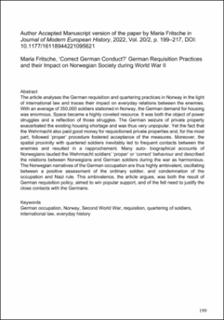‘Correct German Conduct?’ German Requisition Practices and their Impact on Norwegian Society during World War II
Journal article, Peer reviewed
Accepted version
Permanent lenke
https://hdl.handle.net/11250/3059418Utgivelsesdato
2022Metadata
Vis full innførselSamlinger
Originalversjon
Journal of Modern European History. 2022, 20 (2), 199-217. 10.1177/16118944221095621Sammendrag
Abstract The article analyses the German requisition and quartering practices in Norway in the light of international law and traces their impact on everyday relations between the enemies. With an average of 350,000 soldiers stationed in Norway, the German demand for housing was enormous. Space became a highly coveted resource. It was both the object of power struggles and a reflection of those struggles. The German seizure of private property exacerbated the existing housing shortage and was thus very unpopular. Yet the fact that the Wehrmacht also paid good money for requisitioned private properties and, for the most part, followed ‘proper’ procedure fostered acceptance of the measures. Moreover, the spatial proximity with quartered soldiers inevitably led to frequent contacts between the enemies and resulted in a rapprochement. Many autobiographical accounts of Norwegians lauded the Wehrmacht soldiers’ ‘proper’ or ‘correct’ behaviour and described the relations between Norwegians and German soldiers during the war as harmonious. The Norwegian narratives of the German occupation are thus highly ambivalent, oscillating between a positive assessment of the ordinary soldier, and condemnation of the occupation and Nazi rule. This ambivalence, the article argues, was both the result of German requisition policy, aimed to win popular support, and of the felt need to justify the close contacts with the Germans. Keywords German occupation, Norway, Second World War, requisition, quartering of soldiers, international law, everyday history ‘Correct German Conduct?’ German Requisition Practices and their Impact on Norwegian Society during World War II
